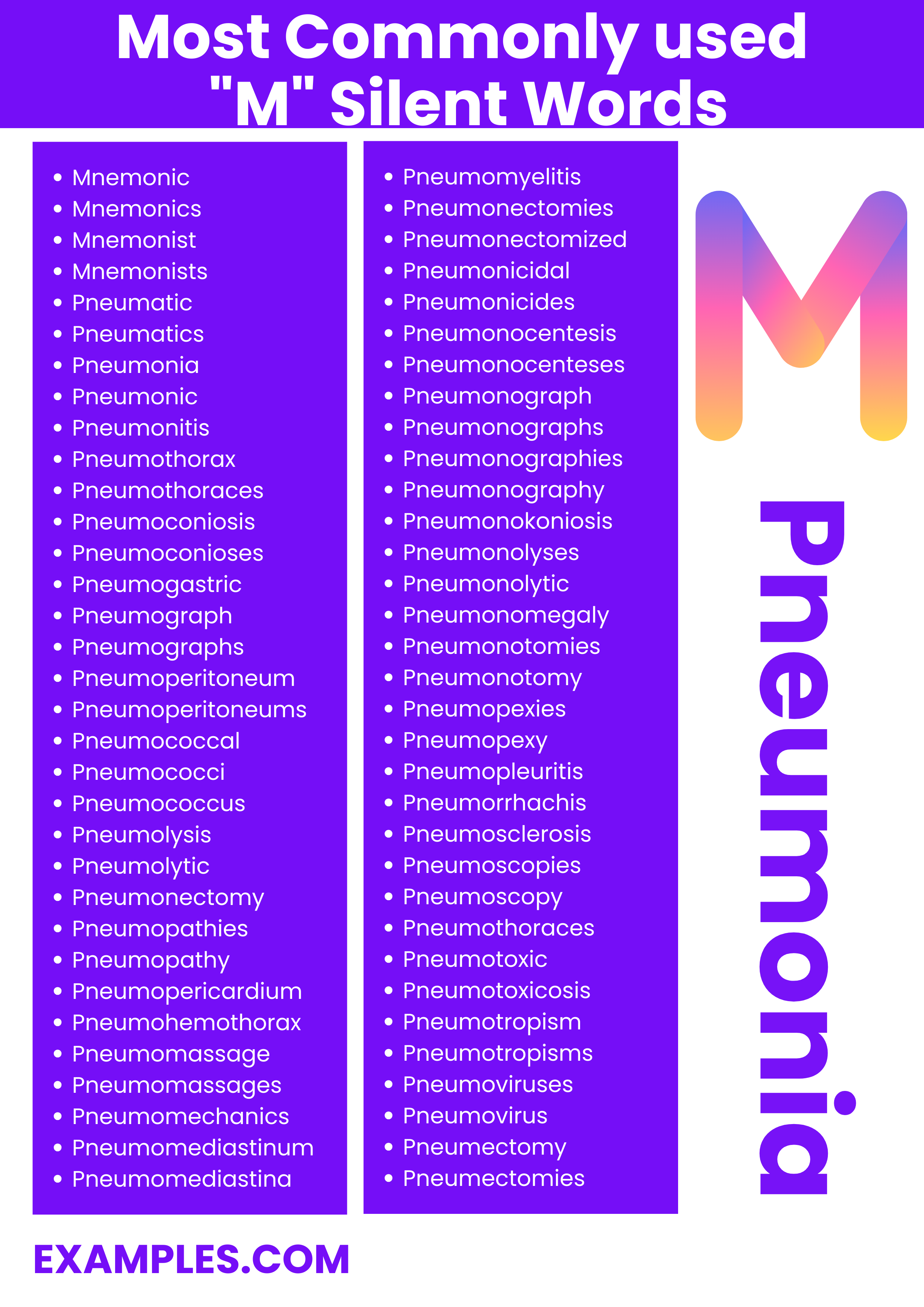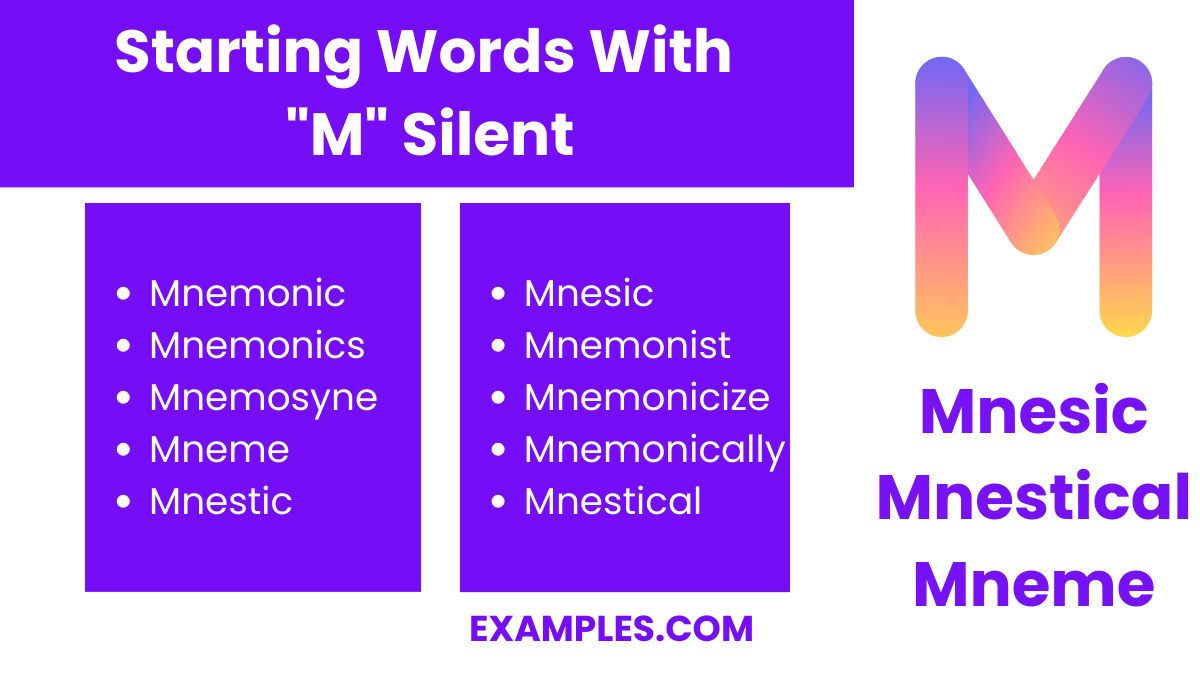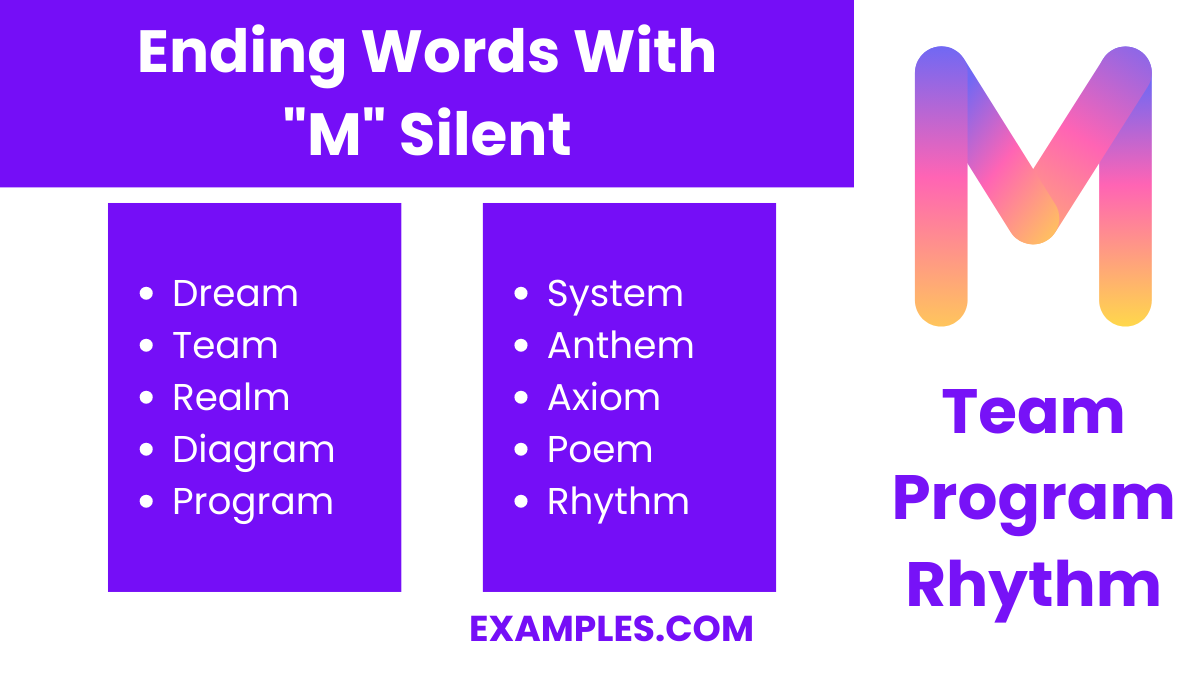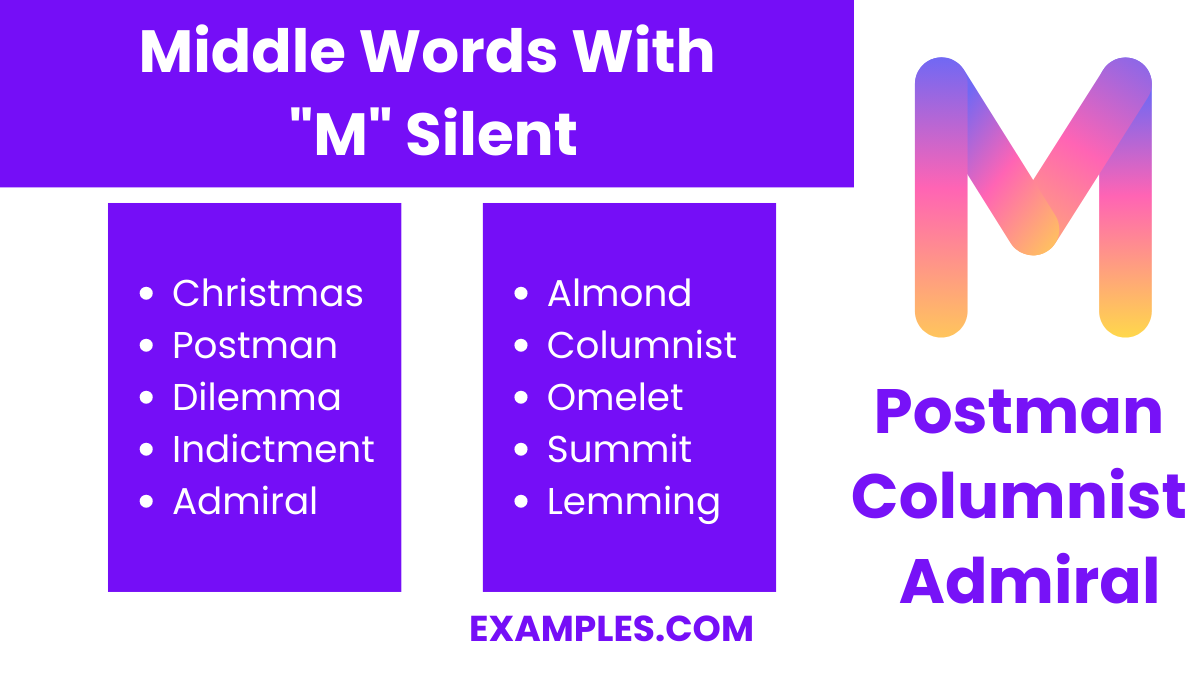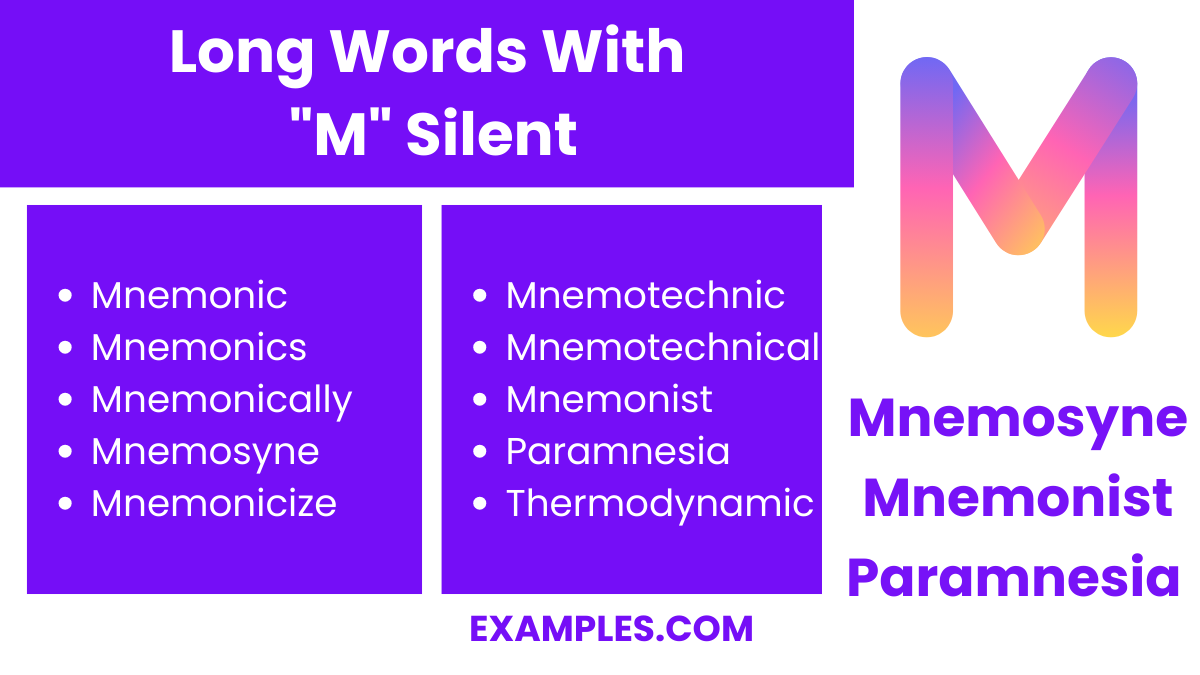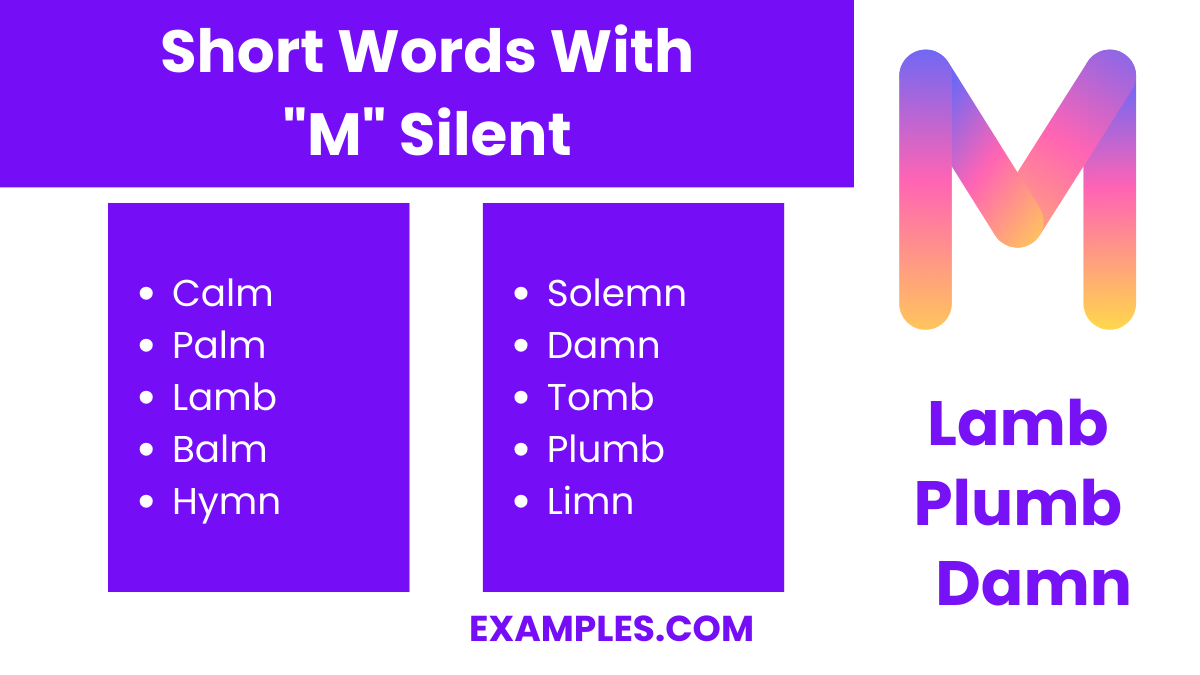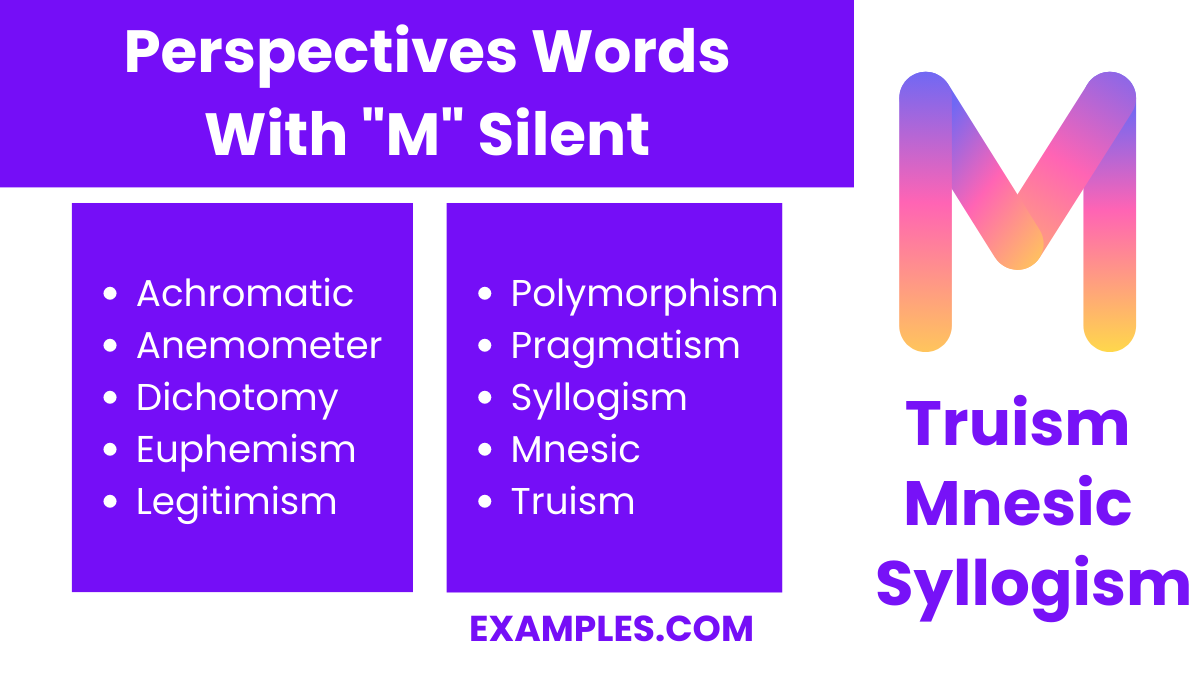450+ M Silent Words List, Meaning, PDF
In the vast and intricate tapestry of the English language, certain words carry silent letters, adding a layer of complexity and fascination. Among these, silent “M” words stand out, intriguing both linguists and language learners. This unique characteristic often originates from the words’ etymological roots, making their pronunciation non-intuitive. Delving into silent “M” words not only enhances one’s vocabulary but also offers a glimpse into the history and evolution of language. Explore these linguistic curiosities and embrace the silent nuances of English.
Download Most Commonly Used M Silent Words - PDF
50+ Most Commonly used “M” Silent Words
Delving into the English language, we encounter the intriguing phenomenon of silent letters, with the silent “M” being particularly noteworthy. These silent “M” words, typically found before the letter “N”, can be perplexing for learners, yet they are often encountered in daily use English words. This compilation is designed to demystify these words, serving as a valuable resource for educators, students, and language enthusiasts alike. Mastery of these words is crucial for enhancing vocabulary and pronunciation skills in English, providing a solid foundation for effective communication.
| Word | Phonetic Pronunciation |
|---|---|
| Mnemonic | nɪˈmɑnɪk |
| Mnemonics | nɪˈmɑnɪks |
| Mnemonist | nɪˈmɑnɪst |
| Mnemonists | nɪˈmɑnɪsts |
| Pneumatic | nuˈmætɪk |
| Pneumatics | nuˈmætɪks |
| Pneumonia | nuˈmoʊniə |
| Pneumonic | nuˈmɑnɪk |
| Pneumonitis | nuˌmoʊˈnaɪtɪs |
| Pneumothorax | nuˈmoʊθɔræks |
| Pneumothoraces | nuˈmoʊθɔrəˌsiz |
| Pneumoconiosis | ˌnjuːməkəʊnɪˈəʊsɪs |
| Pneumoconioses | ˌnjuːməkəʊnɪˈəʊsiːz |
| Pneumogastric | nuːməʊˈɡæstrɪk |
| Pneumograph | ˈnjuːməˌɡræf |
| Pneumographs | ˈnjuːməˌɡræfs |
| Pneumoperitoneum | njuːˌməʊpərɪˈtəʊniəm |
| Pneumoperitoneums | njuːˌməʊpərɪˈtəʊniəmz |
| Pneumococcal | njuːˈmɒkək(ə)l |
| Pneumococci | njuːˈmɒkəsaɪ |
| Pneumococcus | njuːˈmɒkəkəs |
| Pneumolysis | njuːˈmɒlɪsɪs |
| Pneumolytic | ˌnjuːməˈlɪtɪk |
| Pneumonectomy | ˌnjuːməˈnɛktəmi |
| Pneumopathies | njuːˈmɒpəθiːz |
| Pneumopathy | njuːˈmɒpəθi |
| Pneumopericardium | ˌnjuːməʊˌperɪˈkɑːrdiəm |
| Pneumohemothorax | ˌnjuːməʊˈhiːməˌθɔːræks |
| Pneumomassage | ˌnjuːməʊˈmæsɑːʒ |
| Pneumomassages | ˌnjuːməʊˈmæsɑːʒɪz |
| Pneumomechanics | ˌnjuːməʊmɪˈkænɪks |
| Pneumomediastinum | ˌnjuːməʊˌmiːdɪəˈstɪnəm |
| Pneumomediastina | ˌnjuːməʊˌmiːdɪəˈstɪnə |
| Pneumomyelitis | ˌnjuːməʊmaɪəˈlaɪtɪs |
| Pneumonectomies | ˌnjuːməˈnɛktəmiz |
| Pneumonectomized | ˌnjuːməˈnɛktəmaɪzd |
| Pneumonicidal | ˌnjuːməˈnɪsɪdəl |
| Pneumonicides | ˌnjuːməˈnɪsɪdiz |
| Pneumonocentesis | ˌnjuːmənəʊsɛnˈtiːsɪs |
| Pneumonocenteses | ˌnjuːmənəʊsɛnˈtiːsiːz |
| Pneumonograph | ˈnjuːmənəˌɡræf |
| Pneumonographs | ˈnjuːmənəˌɡræfs |
| Pneumonographies | ˈnjuːmənəˌɡræfiz |
| Pneumonography | ˈnjuːmənəˌɡræfi |
| Pneumonokoniosis | ˌnjuːmənəkəʊˈnaɪəsɪs |
| Pneumonolyses | njuːˈmɒnəlaɪsiːz |
| Pneumonolytic | ˌnjuːmənəˈlɪtɪk |
| Pneumonomegaly | ˌnjuːmənəʊˈmɛɡəli |
| Pneumonotomies | ˌnjuːməˈnɒtəmiz |
| Pneumonotomy | ˌnjuːməˈnɒtəmi |
| Pneumopexies | ˈnjuːməpɛksiːz |
| Pneumopexy | ˈnjuːməpɛksi |
| Pneumopleuritis | ˌnjuːməʊplʊəˈraɪtɪs |
| Pneumorrhachis | ˌnjuːməˈrækɪs |
| Pneumosclerosis | ˌnjuːməʊsklɪəˈrəʊsɪs |
| Pneumoscopies | njuːˈmɒskəpiːz |
| Pneumoscopy | njuːˈmɒskəpi |
| Pneumothoraces | nuˈmoʊθɔrəˌsiz |
| Pneumotoxic | ˌnjuːməʊˈtɒksɪk |
| Pneumotoxicosis | ˌnjuːməʊˌtɒksɪˈkəʊsɪs |
| Pneumotropism | ˈnjuːməʊˌtrəʊpɪzəm |
| Pneumotropisms | ˈnjuːməʊˌtrəʊpɪzəmz |
| Pneumoviruses | ˈnjuːməʊˌvaɪrəsɪz |
| Pneumovirus | ˈnjuːməʊˌvaɪrəs |
| Pneumectomy | njuːˈmɛktəmi |
| Pneumectomies | njuːˈmɛktəmiz |
| Pneumonopleurisy | ˌnjuːmənəʊˈplʊərɪsi |
| Pneumopyothorax | ˌnjuːməʊpaɪəʊˈθɔːræks |
| Pneumorrhagia | ˌnjuːməˈrædʒiə |
| Pneumospectroscopy | ˌnjuːməʊspɛkˈtrɒskəpi |
| Pneumotachograph | ˌnjuːməʊˈtækəˌɡrɑːf |
| Pneumotachographs | ˌnjuːməʊˈtækəˌɡrɑːfs |
| Pneumotachometer | ˌnjuːməʊtəˈkɒmɪtə |
| Pneumotachometers | ˌnjuːməʊtəˈkɒmɪtərz |
| Pneumotherapies | ˌnjuːməʊˈθɛrəpiːz |
| Pneumotherapy | ˌnjuːməʊˈθɛrəpi |
| Pneumotomography | ˌnjuːməʊtəˈmɒɡrəfi |
| Pneumotomograms | ˌnjuːməʊˈtɒməˌɡræmz |
| Pneumotomogram | ˌnjuːməʊˈtɒməˌɡræm |
| Pneumotympanites | ˌnjuːməʊtɪmˈpænɪtiːz |
| Pneumotympanitis | ˌnjuːməʊtɪmˈpænɪtɪs |
Starting Words With “M” Silent
Unlock the secrets of English language intricacies with our exploration of encouraging words where the “M” at the beginning remains unvoiced. These unique terms not only offer a fascinating glimpse into the history and evolution of English but also serve as a source of inspiration and motivation. Providing an enriching learning experience, these examples are perfect for expanding linguistic horizons in an engaging and educational manner, enhancing your vocabulary and boosting confidence in language skills.
- Mnemonic (‘nɛmɒnɪk) – A memory aid, especially one that utilizes a system or pattern.
- Mnemonics (‘nɪˈmɒnɪks) – The study and use of systems for improving and assisting memory.
- Mnemosyne (nɪ’mɒzɪni) – In Greek mythology, the goddess of memory and the mother of the Muses.
- Mneme (‘niːmi) – The persistent or recurrent effect of past experience.
- Mnestic (nɛ’stɪk) – Relating to or involved with memory.
- Mnesic (‘nɛzɪk) – Pertaining to memory.
- Mnemonist (nɪ’mɒnɪst) – Someone with exceptional memory skills, especially one who uses mnemonic devices.
- Mnemonicize (‘nɛmənaɪz) – To memorize something using mnemonic techniques.
- Mnemonically (nɪ’mɒnɪkli) – In a manner related to or aiding memory, especially by mnemonic devices.
- Mnestical (nɛ’stɪkəl) – Of or relating to memory.
Ending Words With “M” Silent
Dive into the fascinating world of English where consonant words conclude with a silent ‘M’, presenting a unique phonetic characteristic that defies typical pronunciation rules. This meticulously curated collection aims to enhance linguistic comprehension and pronunciation prowess among students, offering educators a valuable resource to enrich their teaching methodologies. Embracing this compilation stimulates intellectual curiosity and fosters a deeper appreciation for the subtleties of the English language, making it an ideal tool for exploring the intricate patterns that shape linguistic expression.
- Dream (driːm) – A series of thoughts, images, and sensations occurring in a person’s mind during sleep.
- Team (tiːm) – A group of players forming one side in a competitive game or sport.
- Realm (rɛlm) – A kingdom.
- Diagram (‘daɪəgræm) – A simplified drawing showing the appearance, structure, or workings of something; a schematic representation.
- Program (‘proʊgræm) – A planned series of future events, items, or performances.
- System (‘sɪstəm) – A set of things working together as parts of a mechanism or an interconnecting network.
- Anthem (‘ænθəm) – A rousing or uplifting song identified with a particular group, body, or cause.
- Axiom (‘æksiəm) – A statement or proposition which is regarded as being established, accepted, or self-evidently true.
- Poem (poʊ’əm) – A piece of writing that partakes of the nature of both speech and song, and that is typically rhythmical, metaphorical, and often exhibits such formal elements as meter, rhyme, and stanzaic structure.
- Rhythm (‘rɪðəm) – A strong, regular, repeated pattern of movement or sound.
Middle Words With “M” Silent
Venture into the heart of words where the “M” sits quietly in the middle, acting as a silent witness to the terms’ meanings and pronunciations. These describing words challenge students to pay closer attention to the nuances of spelling and pronunciation, enhancing their linguistic skills in a captivating manner. By focusing on this unique aspect, educators can foster a deeper understanding of language intricacies, encouraging learners to explore and appreciate the complexity and beauty of English.
- Christmas (‘krɪsməs) – The annual Christian festival celebrating Christ’s birth, held on December 25.
- Postman (‘pəʊstmən) – A person who delivers mail and parcels.
- Dilemma (dɪ’lɛmə) – A situation in which a difficult choice has to be made between two or more alternatives.
- Indictment (ɪn’daɪtmənt) – A formal charge or accusation of a serious crime.
- Admiral (‘ædmərəl) – A high-ranking officer in the navy.
- Almond (‘ɑːmənd) – The edible nut of a tree of the rose family.
- Columnist (‘kɒləmɪst) – A journalist contributing regularly to a newspaper or magazine.
- Omelet (‘ɒmlɪt) – A dish made by beating eggs and cooking them in a frying pan, often with added ingredients.
- Summit (‘sʌmɪt) – The highest point of a hill or mountain.
- Lemming (‘lɛmɪŋ) – A small, short-tailed, thickset rodent found in the Arctic tundra.
Long Words With “M” Silent
Delve into the fascinating realm of linguistics with long, difficult words featuring a silent “M”. These terms not only enrich vocabulary but also introduce learners to the captivating concept of silent letters, thereby enhancing both spelling and pronunciation skills. Ideal for educational settings, this compilation serves as an engaging tool for teachers aiming to expand students’ linguistic horizons. It encourages a deeper exploration of English’s nuanced complexities, challenging students to master these intricate aspects of the language.
- Mnemonic (‘nɛmɒnɪk) – A device such as a pattern of letters, ideas, or associations that assists in remembering something.
- Mnemonics (nɪˈmɒnɪks) – The study and development of systems for improving and assisting the memory.
- Mnemonically (nɪ’mɒnɪkli) – In a manner that aids memory, particularly through the use of mnemonic devices.
- Mnemosyne (nɪ’mɒzɪni) – In Greek mythology, the goddess of memory.
- Mnemonicize (‘nɛmənaɪz) – To commit to memory using mnemonic techniques.
- Mnemotechnic (ˌnɛməʊ’tɛknɪk) – Relating to the development or use of memory systems.
- Mnemotechnical (ˌnɛməʊ’tɛknɪkəl) – Pertaining to mnemotechnics or mnemonic techniques.
- Mnemonist (nɪ’mɒnɪst) – A person skilled in the art of memory, often using mnemonic devices.
- Paramnesia (ˌpæræm’niːzɪə) – A distortion of memory in which fact and fantasy are confused.
- Thermodynamic (ˌθɜːməʊdaɪ’næmɪk) – Relating to the relationship between heat and other forms of energy.
Short Words With “M” Silent
Short words with silent “M” offer a unique opportunity to explore the idiosyncrasies of English pronunciation and spelling. This selection, perfect for educational purposes, aids teachers in illustrating the concept of silent letters to students, fostering a comprehensive understanding of English phonetics and orthography through concise, impactful examples.
- Calm (kɑːm) – Free from strong or harsh noise; not agitated.
- Palm (pɑːm) – The inner surface of the hand between the wrist and fingers.
- Lamb (læm) – A young sheep.
- Balm (bɑːm) – A fragrant ointment or preparation used to heal or soothe the skin.
- Hymn (hɪm) – A religious song or poem of praise to a deity or deities.
- Solemn (‘sɒləm) – Not cheerful or smiling; serious.
- Damn (dæm) – To condemn, especially by a divine power.
- Tomb (tuːm) – A large vault, typically an underground one, for burying the dead.
- Plumb (plʌm) – Measure (the depth of a body of water).
- Limn (lɪm) – Depict or describe in painting or words.
Perspectives Words With “M” Silent
Intriguing and thought-provoking, words with a silent “M” that embody praising words in terms or relate to positive viewpoints are invaluable resources for educators. These terms not only broaden students’ vocabularies but also deepen their understanding of diverse perspectives and the nuanced nature of language. Such words are ideal for crafting engaging lessons and stimulating discussions, offering opportunities to appreciate and acknowledge the complexities and beauty of English communication.
- Achromatic (ˌeɪkrə’mætɪk) – Without color.
- Anemometer (ˌænɪ’mɒmɪtər) – An instrument for measuring the speed of the wind, or of any current of gas.
- Dichotomy (daɪ’kɒtəmi) – A division or contrast between two things that are represented as being opposed or entirely different.
- Euphemism (‘juːfəmɪzəm) – A mild or indirect word or expression substituted for one considered to be too harsh or blunt when referring to something unpleasant or embarrassing.
- Legitimism (lə’dʒɪtɪmɪzəm) – Support for a political system based on hereditary monarchy.
- Polymorphism (ˌpɒlɪ’mɔːfɪzəm) – The condition of occurring in several different forms.
- Pragmatism (‘prægmətɪzəm) – A pragmatic attitude or policy.
- Syllogism (‘sɪlədʒɪzəm) – A form of reasoning in which a conclusion is drawn from two given or assumed propositions (premises).
- Mnesic (‘nɛzɪk) – Pertaining to memory, especially in terms of mnestic ability.
- Truism (‘truːɪzəm) – A statement that is obviously true and says nothing new or interesting.
In conclusion, the English language is rich with nuances, including words where the letter “m” is silently tucked away, unnoticed in pronunciation. These words, ranging from common to rare, showcase the complexity and history of English. Understanding them enhances our grasp of language subtleties, enriching our communication and linguistic appreciation.



